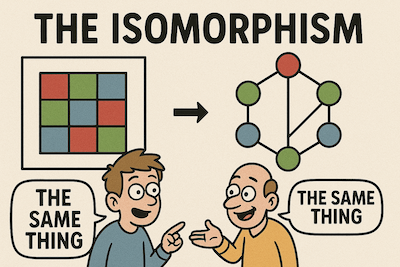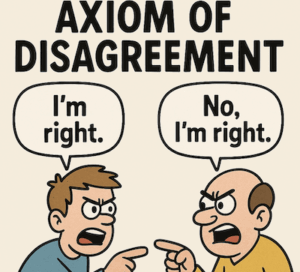Logical inference from accepted truths leads to consistent reasoning. If two parties disagree then there is an error in their logic or no isomorphic map between their axioms.
Is this true? Can axiomatic systems used in mathematics help in understanding disagreements between groups of people.
Aristotle : “Axiom is that which it is impossible to make a mistake about.”
There is a lot to unpack here so it is helpful to review some meaning. An axiom is a truth that exists without further question or proof in a system. It is a starting point for reasoning. Logic is a common syntax with rules of inference that can be applied to axioms to conclude other truths. An isomorphic map is a correspondence between elements of two sets that requires that each element of one set corresponds with one and only one element of the other and that every element of each set has such a correspondence. In addition, an operation on each set should give an element of the set that maps to the same element under a similar operation in the other set. Let’s look in more detail at this last sentence. Imagine a set ![]() with an operation that takes
with an operation that takes ![]() and
and ![]() and gives
and gives ![]() and another set
and another set ![]() with an operation that takes
with an operation that takes ![]() and
and ![]() and gives
and gives ![]() . Say
. Say ![]() (
(![]() maps to
maps to ![]() ), and
), and ![]() , if
, if ![]() then the map is isomorphic.
then the map is isomorphic.

The principle of an isomorphism is that you can perform operations, or reasoning, in one set and then map the end of that reasoning to the other set. The same answer should be derived by mapping the original premise immediately to the other set and performing the operations in that set.
If two parties disagree and have the same axioms or axioms that are an isomorphism then their disagreement is a result of one or both parties error in logic. In principle, each party would be able to use rules of inference such as ‘if axiom then x’ followed by ‘if x then ….’ to build a position that is either identical, or, through the isomorphism, logically equivalent and so agreeable.
However, if the parties have different axioms that do not form an isomorphism then it would not generally be possible for them to reach agreement. Outside of chance, it would not matter how the argument is phrased, agreement could not be reached by logical inference from their axioms. Certainly not across a number of subjects. Only in the case where the subject is a restricted subset of axioms would there be a chance of agreement.
In this proposition, the ability to resolve dispute rests in understanding which of the above two general conditions is at play. If axioms are isomorphic then the disagreement can be resolved by correcting the logic and agreement can be reached. If they are not, then an option is to trial isomorphism on a restricted set of axioms. This will lead to agreement in some areas but not ‘universal integration’ . Another option is to ask a party to change their axioms. These axioms may be successful and purposeful to their system; identity is lost in this process. The final solution is that opinions from different axioms can coexist but not logically in the same system.
Kurt Gödel : “The more I think about language, the more it amazes me that people ever understand each other.”
An outcome from this reasoning is that disagreement can be resolved where two parties have the same or isomorphic axioms. If they do not then universal agreement cannot be achieved and the most functional position is coexistence to retain identity but in separated spaces.



